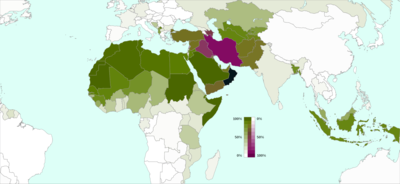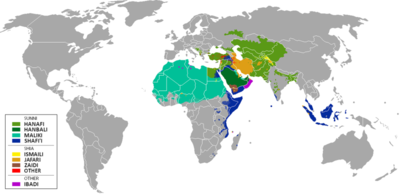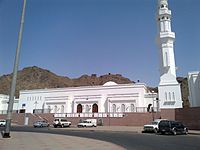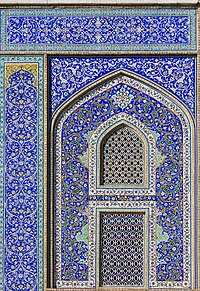Outline of Islam
| Part of a series on |
| Islam |
|---|
 |
Islam is an Abrahamic monotheistic religion teaching that there is only one God (Allah)[1] and that Muhammad is His last Messenger.[2][3]
The following outline is provided as an overview of and topical guide to Islam.
Beliefs[edit]
| Part of a series on Aqidah |
|---|
 |
|
Including:
|
Aqidah[edit]
- Allah
- God in Islam
- Tawhid, Oneness of God
- Repentance in Islam
- Islamic views on sin
- Shirk, Partnership and Idolatory
- Haram
- Kufr
- Bid‘ah
Prophets[edit]
| Part of a series on |
| Muhammad |
|---|
Scripture[edit]
| Quran |
|---|
| Part of a series on |
| Hadith |
|---|
 |
|
|
- List of Islamic texts
Denominational specifics[edit]
| Part of a series on |
| Ali |
|---|
.jpg/140px-Arabic_caligraphic_seal_in_Hagia_Sophia_(cropped).jpg) |
- Shia beliefs
- Ahl al-Kisa
- Imamah
- Mourning of Muharram
- Tawassul
- The Four Companions
- Shia clergy
- Twelver beliefs
- Ismaili beliefs
- Nizari Ismaili beliefs
- Alevi beliefs
- Ahmadi beliefs
Practice[edit]
Denominational specifics[edit]
- Shia rituals
- Ahmadiyya view
Schools and branches[edit]


| Part of a series on Sunni Islam |
|---|
|
|
| Part of a series on:
Salafi movement |
|---|
 |
|
|
- Schools of Islamic theology
- Madhhab
- Divisions of the world in Islam
- Islamic schools and branches a.k.a. The Islamic denomination or Muslim denominations
- Denominational
- Sunni Islam, a.k.a. Ahlus Sunnah wal Jamaah
- Shia Islam
- Kharjites
- Ibadi
- Sufism – Tariqa – List of Sufi orders
- Schools of Jurisprudence, Branches, Doctrines and Movements
- Sunni
- Hanafi
- Maliki
- Shafi'i
- Hanbali
- Zahiri
- Ahl al-Hadith, (School of 2nd/3rd Islamic centuries)
- Ahl-i Hadith, (Movement in South-Asia in mid-nineteenth English century)
- Salafi movement
- Wahhabism
- Shia
- Sunni
- Schools of Islamic theology
- Other branches
- Denominational
- Conferences, Movements and Organizations on Union and Peace
- Amman Message
- 2016 international conference on Sunni Islam in Grozny
- Organisation of Islamic Cooperation
- The World Forum for Proximity of Islamic Schools of Thought
- Islamic Unity week
- Al-Azhar Shia Fatwa
- International Islamic Unity Conference (Iran)
- International Islamic Unity Conference (US)
- Al-Azhar Shia Fatwa
- The World Forum for Proximity of Islamic Schools of Thought
- The Humanitarian Forum
- Islamic Relief
- British Muslim Forum
- Muslim Charities Forum
- Catholic–Muslim Forum
- Muslim Safety Forum
- A Common Word Between Us and You
- Hindu–Muslim unity
Philosophy[edit]
- Islamic philosophy
- Early Islamic philosophy
- Islamic ethics
- Logic in Islamic philosophy
- Islamic metaphysics
- Sufi philosophy
- Islamic attitudes towards science
- Science in the medieval Islamic world
- Alchemy and chemistry in the medieval Islamic world
- Astrology in the medieval Islamic world
- Astronomy in the medieval Islamic world
- Cosmology in medieval Islam
- Geography and cartography in the medieval Islamic world
- Mathematics in the medieval Islamic world
- Medicine in the medieval Islamic world
- Prophetic medicine
- Ophthalmology in the medieval Islamic world
- Physics in the medieval Islamic world
- Psychology in the medieval Islamic world
- Islamic view of miracles
- Contemporary Islamic philosophy
Theology[edit]
- Islamic religious sciences
- Islamic theology
- Theological concepts
- Ahl al-Hadith (started in 2nd/3rd Islamic centuries)
- Ahl-i Hadith (another movement in South-Asia in mid-nineteenth English century)
- Ahl ar-Ra'y
- Divisions of the world in Islam
- Fi sabilillah
- Ihsan
- Iman
- Itmam al-hujjah
- Wasat
- Shia theological concepts
- Categorization of individuals
- Groups
- Theological titles
- Theological concepts
- Islamic mythology
- Beings
- Exorcism in Islam, Ruqya
- Places
- Islamic eschatology
Law[edit]
| Part of a series on |
| Islamic jurisprudence (fiqh) |
|---|
| Islamic studies |
- Sharia
- Fiqh, The Islamic jurisprudence
- Hisbah
Hadith[edit]
- Main article
- Hadith
- Important Sunni Hadith
- Kutub al-Sittah
- Sahih al-Bukhari
- Sahih Muslim
- Al-Sunan al-Sughra
- Sunan Abu Dawood
- Jami` at-Tirmidhi
- Sunan ibn Majah
- Important Shia Hadith
- The Four Books
- Kitab al-Kafi
- Man la yahduruhu al-Faqih
- Tahdhib al-Ahkam
- Al-Istibsar
- Hadith Collectors
- Muhammad al-Bukhari
- Muslim ibn al-Hajjaj
- Abu Dawood
- Commentary for Sahih al-Bukhari
- Fath al-Bari
- Related
- Hadith studies
- Hadith terminology
The supernatural in Islam[edit]
- Islamic Concept of God
- God in Islam
- Names of God in Islam
- Allah
- The Light before the Material World
- Nūr (Islam)
- Muhammad in Islam
- Al-Insān al-Kāmil
- Holy Spirit in Islam
- The Angels
- Angels in Islam
- Alam al Jabarut
- Archangel
- Artiya'il
- Azrael
- Cherub
- Darda'il
- Gabriel
- Habib
- Harut and Marut
- Illiyin
- Israfil, Raphael (archangel)
- Jannah
- Kiraman Katibin
- Michael (archangel)
- Mu'aqqibat, Hafaza, The Guardian angels
- Recording angel
- Riḍwan
- Seraph
- Beings and Forces in ordinary life
- Asmodeus
- Al-Baqarah
- Al-Ikhlas
- Al-Mu'awwidhatayn
- Adhan
- Throne Verse, also known as Al-Baqara 255 and Ayatul Kursi
- Evil eye
- Hatif
- Hinn (mythology)
- Ifrit
- Jinn
- Sura Al-Jinn
- Exorcism in Islam
- Marid
- Magic (paranormal)
- Malakut
- Peri
- Qalb
- Qareen
- Solomon in Islam
- Death and Human spirit
- Barzakh
- Illiyin
- Islamic view of death
- Munkar and Nakir
- Nāzi'āt and Nāshiṭāt
- Nafs
- Rūḥ
- Fallen Angels, Devils and Hell
- As-Sirāt
- Azazel
- Dajjal
- Div
- Falak (Arabian legend)
- Fallen angel
- Iblis
- Jahannam
- Maalik
- Nar as Samum
- Shaitan
- Sijjin
- Zabaniyya
- Zaqqum
Islamic Legends[edit]
- Adam in Islam
- Akhirah
- Al-Safa and Al-Marwah
- Azazel
- Azrael
- Barzakh
- Beast of the Earth
- Biblical and Quranic narratives
- Biblical figures in Islamic tradition
- Black Standard
- Black Stone
- Cain and Abel in Islam
- Crescent
- Darda'il
- Devil (Islam)
- Dhul-Qarnayn
- Dome of the Rock
- Foundation Stone
- Gabriel
- Gog and Magog
- Green in Islam
- Hafaza
- Hajj
- Harut and Marut
- Hateem
- Holy Spirit (Islam)
- Ishmael in Islam
- Islamic eschatology
- Islamic flags
- Islamic view of angels
- Islamic view of Jesus' death
- Isra and Mi'raj
- Israfil
- Jahannam
- Jannah
- Jesus in Ahmadiyya Islam
- Jesus in Islam
- Kaaba
- Khidr
- Kiraman Katibin
- Kiswah
- Maalik
- Mahdi
- Mary in Islam
- Masih ad-Dajjal
- Michael (archangel)
- Moses in Islam
- Mu'aqqibat
- Munkar and Nakir
- Noah in Islam
- Queen of Sheba
- Raphael (archangel)
- Recording angel
- Ridwan (name)
- Rub el Hizb
- Sarah
- Satan
- Solomon in Islam
- Star and crescent
- Symbols of Islam
- Tawaf
- The Occultation
- Well of Souls
- Zamzam Well
- Zaqqum
History[edit]
- History of Islam
- Timeline of Muslim history Year by Year
- Timeline of 6th-century Muslim history
- Timeline of 7th-century Muslim history
- Timeline of 8th-century Muslim history
- Timeline of 9th-century Muslim history
- Timeline of 10th-century Muslim history
- Timeline of 11th-century Muslim history
- Timeline of 12th-century Muslim history
- Timeline of 13th-century Muslim history
- Timeline of 14th-century Muslim history
- Timeline of 15th-century Muslim history
- Timeline of 16th-century Muslim history
- Timeline of 17th-century Muslim history
- Timeline of 18th-century Muslim history
- Timeline of 19th-century Muslim history
- Timeline of 20th-century Muslim history
- Timeline of 21st-century Muslim history
- Early history
- Classical era
- Pre-Modern era
- Modern times
History of Islam by topic[edit]
Society[edit]
| Today |
Using tabular calculations |
- Ummah
- Islamic calendar
- Islam and humanity
- Islam and children
- Gender roles in Islam
- Women in Islam
- LGBT in Islam
- Mukhannathun
- Islam and clothing
- Animals in Islam
- Muslim holidays
- Qurbani
- Nursing in Islam
- Symbols of Islam
- Islamic education
Places[edit]
- Holiest sites in Islam
- Mecca
- Medina
- Al Quds
- Holiest sites in Sunni Islam
- Holiest sites in Shia Islam
Culture[edit]
- Islamic culture
- Islamic art
- Islamic architecture
- Architectural elements
- Architectural types
- Islamic calligraphy
- Islamic garden
- Islamic glass
- Islamic literature
- Islamic music
- Oriental rug
- Islamic pottery
- Islam and sport
Politics[edit]
- Political aspects of Islam
- Shia–Sunni relations
- Islam and modernity
- Persecution of Muslims
Muslim world[edit]

| Islam by country |
|---|
 |
|
|
- Muslim world
- Islamic organizations
- International organization
- Islamic political parties
- Islamic democratic
- National Islamic Movement of Afghanistan (Afghanistan)
- Islamic Renaissance Movement (Algeria)
- Al-Menbar Islamic Society (Bahrain)
- Bangladesh Islami Front (Bangladesh)
- Islami Oikya Jote (Bangladesh)
- Party of Democratic Action (Bosnia and Herzegovina)
- Al-Wasat Party (Egypt)
- National Awakening Party (Indonesia)
- National Mandate Party (Indonesia)
- United Development Party (Indonesia)
- All India Majlis-e-Ittehadul Muslimeen (India)
- Indian Union Muslim League (India)
- Islamic Action Organisation (Iraq)
- Islamic Dawa Party (Iraq)
- Islamic Fayli Grouping in Iraq (Iraq)
- Kurdistan Islamic Group (Iraq)
- Islamic Labour Movement in Iraq (Iraq)
- Islamic Union of Iraqi Turkoman (Iraq)
- Islamic Centrist Party (Jordan)
- National Patriotic Party (Kazakhstan)
- United Malays National Organisation (Malaysia)
- Jamaat-e-Islami Pakistan (Pakistan)
- Pakistan Tehreek-e-Insaf (Pakistan)
- Lakas–CMD (Philippines)
- Moro Islamic Liberation Front (Philippines)
- United Bangsamoro Justice Party (Philippines)
- Ideal Democratic Party (Rwanda)
- Sri Lanka Muslim Congress (Sri Lanka)
- Ennahda Movement (Tunisia)
- Islamic liberal
- Islamic Iran Participation Front (Iran)
- National Forces Alliance (Libya)
- Sunni Islamist
- Islamic Dawah Organisation of Afghanistan (Afghanistan)
- Hezbi Islami (Afghanistan)
- Jamiat-e Islami (Afghanistan)
- Green Algeria Alliance (Algeria)
- Movement of Society for Peace (Algeria)
- Movement for National Reform (Algeria)
- Bangladesh Jamaat-e-Islami (Bangladesh)
- Islamic Front Bangladesh (Bangladesh)
- Committee for National Revolution (East Turkestan)
- Freedom and Justice Party (Egypt)
- Building and Development Party (Egypt)
- Islamic Party (Egypt)
- Prosperous Justice Party (Indonesia)
- Crescent Star Party (Indonesia)
- Reform Star Party (Indonesia)
- Iraqi Islamic Party (Iraq)
- Kurdistan Islamic Union (Iraq)
- Zamzam (party) (Jordan)
- Islamic Action Front (Jordan)
- Hadas (Kuwait)
- Al-Jama'a al-Islamiyya (Lebanon)
- Justice and Construction Party (Libya)
- Homeland Party (Libya)
- Malaysian Islamic Party (PAS) (Malaysia)
- Islamic Democratic Party (Maldives)
- Justice and Development Party (Morocco)
- Jamiat Ahle Hadith (Pakistan)
- Jamiat Ulema-e Islam (F) (Pakistan)
- Hamas (Palestine)
- National Congress (Sudan)
- Muslim Brotherhood of Syria (Syria)
- Islamic Renaissance Party of Tajikistan (Tajikistan)
- Felicity Party (Turkey)
- Shia Islamist
- Islamic Movement of Afghanistan (Afghanistan)
- Hizb-i-Wahdat (Afghanistan)
- Islamic Party of Azerbaijan (Azerbaijan)
- Al Wefaq (Bahrain)
- Bahrain Freedom Movement (Bahrain)
- Islamic Action Society (Bahrain)
- Hezbollah (Lebanon)
- Alliance of Builders of Islamic Iran (Iran)
- Islamic Coalition Party (Iran)
- National Iraqi Alliance (Iraq)
- Islamic Dawa Party – Iraq Organisation (Iraq)
- Islamic Supreme Council of Iraq (Iraq)
- Islamic Virtue Party (Iraq)
- Tehrik-e-Jafaria (Pakistan)
- Salafist
- Al Asalah (Bahrain)
- Young Kashgar Party (East Turkestan)
- Al-Nour Party (Egypt)
- Adhaalath Party (Maldives)
- Muttahida Majlis-e-Amal (Pakistan)
- Al-Islah (Yemen)
- Islamic democratic
- Militant organization
- Non-governmental organization
- Muslim Brotherhood (Egypt)
- Muhammadiyah (Indonesia)
- Nahdlatul Ulama (Indonesia)
- Indonesian Ulema Council (Indonesia)
- PERSIS (organization) (Indonesia)
- Islamic Defenders Front (Indonesia)
- Tamil Nadu Muslim Munnetra Kazagham (India)
- Popular Front of India (India)
- Dawat-e-Islami (Pakistan)
- Society of the Revival of Islamic Heritage
- Muslim World League
- Islamic relief organizations
People[edit]
Key religious figures[edit]
Muhammad[edit]
Sahabah[edit]
- Ashara e mubashra
- Hadith of the ten promised paradise
- Abu Bakr
- Umar
- Uthman ibn Affan
- Ali
- Talhah
- Az-Zubair
- Abdur Rahman bin Awf
- Sa'd bin Abi Waqqas
- Abu Ubaidah ibn al-Jarrah
- Sa'id ibn Zayd
- Most hadith narrating sahabah
- Abu Hurairah
- Abdullah Ibn Umar
- Anas ibn Malik
- Aisha
- Abd Allah ibn Abbas
- Jabir ibn Abd Allah
- Abu Sa‘id al-Khudri
- Abdullah ibn Masud
- 'Abd Allah ibn 'Amr ibn al-'As
Umar[edit]
- Family tree of Umar
- Umm Kulthum bint Ali (Wife)
- Abdullah ibn Umar (son)
- Hafsa bint Umar (Daughter)
- Asim ibn Umar (son)
- Sunni view of Umar
- Shi'a view of Umar
- Ten Promised Paradise
Uthman[edit]
Denominational specifics[edit]
Sunni Islam[edit]
- List of Sunni Islamic scholars by schools of jurisprudence
Deobandi[edit]
- List of Deobandis
- List of students of Mahmud Hasan Deobandi
- List of Darul Uloom Deoband alumni
- Ashraf Ali Thanwi
- Hussain Ahmed Madani
Barelvi[edit]
Shia Islam[edit]
- The Four Companions
- Holy women of Shia Islam
- Companions of Ali ibn Abi Talib
- Companions of Ali ibn Husayn Zayn al-Abidin
- List of Shia Imams
Imami Twelver[edit]
| The Fourteen Infallibles |
|---|
Imami Ismailism[edit]
Alevism[edit]
Key figures
Islamism[edit]
Key ideologues
Modernist Salafism[edit]
Salafi movement[edit]
Sufism[edit]
List of Muslims by topic[edit]
Historical[edit]
- List of Ayyubid sultans and emirs
- List of Mamluk sultans
- List of Ghaznavid sultans
- Grand Viziers of the Safavid Empire
- Viziers of the Samanid Empire
- List of Sheikh-ul-Islams of the Ottoman Empire
- Grand Viziers of Ottoman Empire
[edit]
Professional[edit]
|
Regional[edit]
See also[edit]
References[edit]
- ^ quran.com, Quran Surah Al-Baqara ( Verse 255 )
- ^ John L. Esposito (2009). "Islam. Overview". In John L. Esposito (ed.). The Oxford Encyclopedia of the Islamic World. Oxford: Oxford University Press. doi:10.1093/acref/9780195305135.001.0001. ISBN 9780195305135.
Profession of Faith [...] affirms Islam's absolute monotheism and acceptance of Muḥammad as the messenger of God, the last and final prophet.
- ^ F. E. Peters (2009). "Allāh". In John L. Esposito (ed.). The Oxford Encyclopedia of the Islamic World. Oxford: Oxford University Press. doi:10.1093/acref/9780195305135.001.0001. ISBN 9780195305135.
the Muslims' understanding of Allāh is based [...] on the Qurʿān's public witness. Allāh is Unique, the Creator, Sovereign, and Judge of humankind. It is Allāh who directs the universe through his direct action on nature and who has guided human history through his prophets, Abraham, with whom he made his covenant, Moses, Jesus, and Muḥammad, through all of whom he founded his chosen communities, the "Peoples of the Book."
- ^ Quran 19:53
- ^ Quran 19:41
- ^ Quran 9:70
- ^ a b Quran 2:124
- ^ Quran 87:19
- ^ Quran 22:43
- ^ a b c d e Quran 42:13
- ^ Quran 2:31
- ^ a b c d e f g Quran 6:89
- ^ Quran 17:55
- ^ Quran 37:123
- ^ Quran 37:124
- ^ Quran 19:56
- ^ Quran 21:85–86
- ^ a b Quran 26:125
- ^ Quran 7:65
- ^ a b Quran 19:49
- ^ a b Quran 19:54
- ^ a b Quran 26:178
- ^ Quran 7:85
- ^ Quran 19:30
- ^ Quran 4:171
- ^ a b c Quran 46:35
- ^ a b c Quran 33:7
- ^ Quran 57:27
- ^ Quran 61:6
- ^ a b Quran 4:89
- ^ Quran 3:39
- ^ Quran 40:34
- ^ Quran 37:139
- ^ Quran 10:98
- ^ Quran 6:86
- ^ Quran 37:133
- ^ Quran 7:80
- ^ Quran 26:107
- ^ Quran 26:105
- ^ Page 50 "As early as Ibn Ishaq (85–151 AH) the biographer of Muhammad, the Muslims identified the Paraclete – referred to in John's ... "to give his followers another Paraclete that may be with them forever" is none other than Muhammad."
- ^ Quran 33:40
- ^ Quran 33:40
- ^ Quran 42:7
- ^ Quran 7:158
- ^ a b Quran 19:51
- ^ Quran 53:36
- ^ Quran 43:46
- ^ a b Quran 26:143
- ^ Quran 7:73

.jpeg/110px-Islamic_Tiling_(186943375).jpeg)






.svg/100px-Flag_of_the_Mamluk_Sultanate_(Alexandria).svg.png)
.svg/60px-Coat_of_arms_of_the_Ottoman_Empire_(1882%e2%80%931922).svg.png)